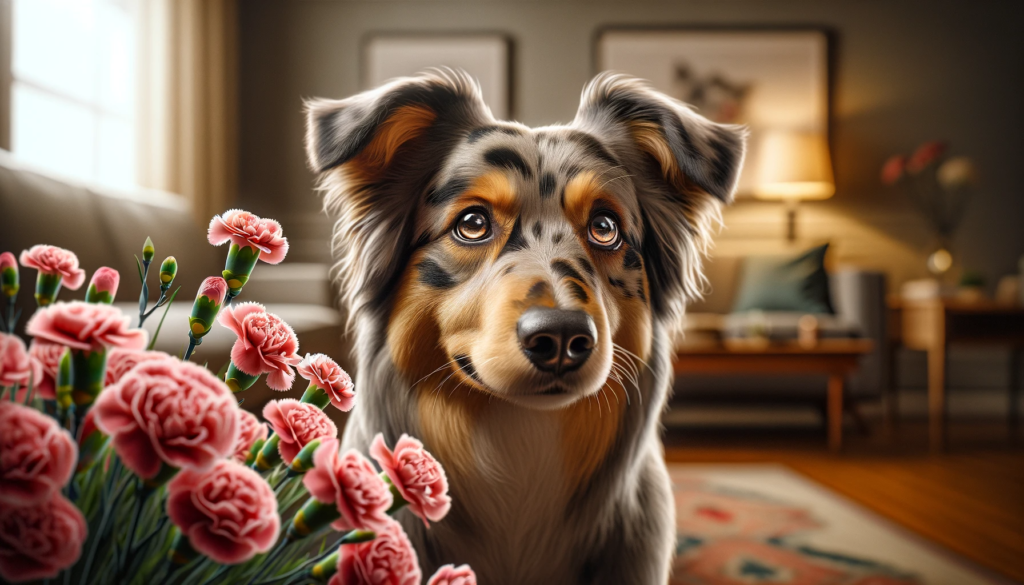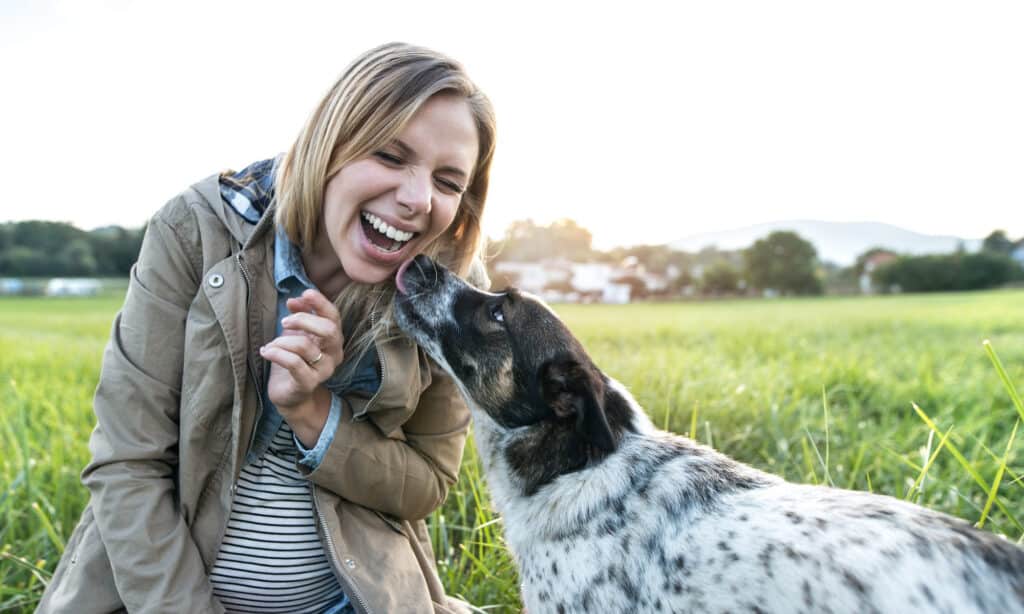Carnations are beautiful, popular flowers that come in a variety of colors and are often used for decorative purposes. However, as a responsible pet owner, it’s important to know whether carnations can be harmful to your furry friend.
In this blog post, we’ll discuss the potential dangers of carnations to dogs, what to do if your dog eats them, signs and symptoms of plant ingestion, and when to take your dog to the vet. Additionally, we’ll cover preventative measures you can take to keep your dog safe and explore the reasons why dogs might be attracted to carnations in the first place.
We’ve consulted with experts in the field to provide you with accurate and reliable information on this topic. So, if you’re a dog owner who loves flowers, keep reading to learn everything you need to know about carnations and your canine companion.

What Are Carnations?
Carnations, Dianthus caryophyllus, are popular flowers with various colors such as white, pink, red, yellow, and purple. They are often used in floral arrangements, as gifts, and for decorative purposes.
Carnations are native to the Mediterranean region but have been cultivated and grown worldwide for centuries. They are also used in the production of essential oils, perfumes, and cosmetics due to their pleasant fragrance.
While carnations are generally considered safe for humans, it’s important to determine whether they are safe for dogs as well. So, let’s explore whether carnations are toxic to dogs in the next section.
Are Carnations Toxic To Dogs?
Have you ever wondered whether carnations are safe for dogs? Carnations are safe for humans but mildly toxic to dogs.
If your dog ingests carnations, they may experience digestive upset, such as vomiting, diarrhea, and abdominal pain. They could also experience mild to moderate skin irritation if they come into contact with the plant’s sap or leaves.
The severity of the toxicity can vary depending on the amount ingested, the size of the dog, and the dog’s overall health. Some types of pink carnations may contain a chemical called naphthalene, which can lead to anemia in dogs by breaking down red blood cells.
Although carnations are not as toxic as some other plants, it’s still important to keep them away from your furry friend. If you suspect that your dog has ingested carnations or is experiencing any symptoms of toxicity, seek veterinary care right away.

What Should You Do If Your Dog Eats Carnations?
If you suspect that your dog has ingested carnations, the first thing you should do is call your veterinarian. They can give you advice on what steps to take next and whether you need to bring your dog in for an evaluation.
Depending on the amount of carnations your dog ate and their size, your veterinarian may recommend inducing vomiting or monitoring them closely for any signs of toxicity. They may also recommend a physical exam or bloodwork to check for any underlying health issues that could be exacerbating the effects of the carnations.
It’s important to remember that not all dogs will show immediate signs of toxicity, so monitoring your dog closely for any symptoms is crucial. If you notice any signs of digestive upset, such as vomiting or diarrhea, or if your dog seems lethargic or has a loss of appetite, contact your veterinarian immediately.
In some cases, your veterinarian may recommend hospitalization or supportive care to help your dog recover.
Remember, the best way to prevent your dog from eating carnations is to keep them out of reach. If you have carnations in your home or garden, make sure they are in a place where your dog cannot access them. If you’re unsure whether a plant is safe for your dog, it’s always better to err on the side of caution and avoid exposing them to it.
Potential Physical Dangers Presented by Carnations
While carnations are not necessarily lethal to dogs, they can still cause a variety of physical dangers.
One of the main dangers of carnations is gastrointestinal upset. If your dog ingests carnations, they may experience vomiting, diarrhea, abdominal pain, and loss of appetite. These symptoms can range from mild to severe depending on the amount of carnations ingested and the size of your dog.
Another potential danger of carnations is skin irritation. Some dogs may develop mild to moderate skin irritation if they come into contact with the plant’s sap or leaves. This can lead to redness, swelling, and itching.
In some cases, dogs may also experience an allergic reaction to carnations, which can cause symptoms such as hives, facial swelling, and difficulty breathing. If your dog experiences any of these symptoms after coming into contact with carnations, seek veterinary care immediately.
Lastly, certain types of carnations may contain a chemical called naphthalene, which can cause red blood cells to break down and lead to anemia in dogs. This is a more serious complication and requires immediate veterinary care.
It’s important to remember that every dog is different, and some may be more sensitive to carnations than others. If you suspect that your dog has ingested or come into contact with carnations, monitor them closely for any signs of physical distress and contact your veterinarian for advice.

Signs and Symptoms of Carnation Plant Ingestion
If your dog ingests carnations, they may exhibit a variety of signs and symptoms, including:
- Vomiting
- Diarrhea
- Abdominal pain
- Loss of appetite
- Lethargy
- Excessive drooling
- Mouth irritation
- Skin irritation
- Redness, swelling, or itching of the skin
- Allergic reactions, such as hives, facial swelling, or difficulty breathing
The severity of these symptoms can vary depending on the amount of carnations ingested and the size of your dog. Some dogs may only experience mild symptoms, while others may exhibit more severe symptoms requiring immediate veterinary care.
It’s important to remember that not all dogs will exhibit immediate signs of toxicity, so it’s crucial to monitor your dog closely if you suspect they have ingested carnations. If you notice any signs of digestive upset, skin irritation, or allergic reactions, contact your veterinarian immediately.
Early intervention can help prevent more serious complications and improve your dog’s chances of a full recovery.
When Should You Take Your Dog To The Vet?
If you suspect that your dog has ingested carnations, it’s important to contact your veterinarian right away. They can provide you with advice on what steps to take next and whether your dog needs to come in for an evaluation.
You should take your dog to the vet immediately if they exhibit any of the following signs and symptoms:
- Difficulty breathing
- Severe vomiting or diarrhea
- Abdominal bloating or distension
- Severe abdominal pain
- Loss of consciousness or seizures
- Lethargy or weakness
- Pale gums or tongue
- Inability to stand or walk normally
- Rapid heartbeat or breathing
- Collapse
These symptoms may indicate a more serious complication, such as an allergic reaction, anemia, or other complications that require immediate medical attention.
Even if your dog is not exhibiting these severe symptoms, it’s still important to contact your veterinarian and seek their advice on the best course of action. They may recommend monitoring your dog closely for any signs of toxicity or bringing them in for an evaluation.

Prevention Is The Best Medicine – How To Prevent Your Dog from Eating Carnations
Prevention is the best medicine when it comes to keeping your dog safe from toxic plants like carnations. Here are some tips to help you prevent your dog from eating carnations:
- Keep carnations out of reach: If you have carnations in your home or garden, make sure they are in a place where your dog cannot access them. This can mean keeping them on high shelves, in closed rooms, or behind barriers.
- Train your dog: Train your dog to stay away from plants and other items that are off-limits. This can include using positive reinforcement training and teaching your dog a “leave it” command.
- Use deterrents: You can use bitter-tasting sprays or other deterrents to keep your dog away from plants like carnations. These can be found at pet stores and online.
- Identify toxic plants: Make sure you are aware of all the toxic plants in your home and garden. This will help you take steps to prevent your dog from coming into contact with them.
- Supervise your dog: Supervise your dog when they are outside or in areas where there are plants. This can help you catch any attempts to eat carnations or other toxic plants.
It’s important to remember that prevention is the most effective way to ensure your dog’s safety when it comes to toxic plants. If you’re unsure about a plant’s safety, it’s always best to err on the side of caution and avoid exposing your dog to it. By taking steps to keep toxic plants out of your dog’s reach and being vigilant, you can help prevent accidental ingestion and keep your dog healthy and happy.
So, Why Do Dogs Eat Carnations?
Dogs are naturally curious creatures and may be attracted to the scent and taste of carnations. Some dogs may also be drawn to the texture and shape of the flower or enjoy the act of chewing on plants.
In some cases, dogs may eat carnations out of boredom or as a way to relieve stress or anxiety. This is why it’s important to provide your dog with plenty of mental and physical stimulation through activities such as daily walks, playtime, and puzzle toys.
It’s also possible that dogs may eat carnations simply because they are accessible and within reach. This is why it’s crucial to keep all potentially toxic plants out of your dog’s reach and to supervise them closely when they are around plants.
Lastly, some dogs may have an underlying health issue that is causing them to crave non-food items, including plants. If your dog consistently shows a strong desire to eat non-food items, it’s important to bring them in for an evaluation to rule out any medical issues.

Conclusion
Carnations can pose a potential threat to dogs if ingested. While they may not be as toxic as some other plants, they can still cause digestive upset, skin irritation, and other physical dangers. It’s important to be aware of the signs and symptoms of carnation plant ingestion and to take your dog to the veterinarian if you suspect they have ingested carnations.
Prevention is key when it comes to keeping your dog safe from toxic plants like carnations. By keeping all potentially toxic plants out of reach, training your dog to avoid plants, and supervising them when they are around plants, you can help prevent accidental ingestion.
~Lindsie
